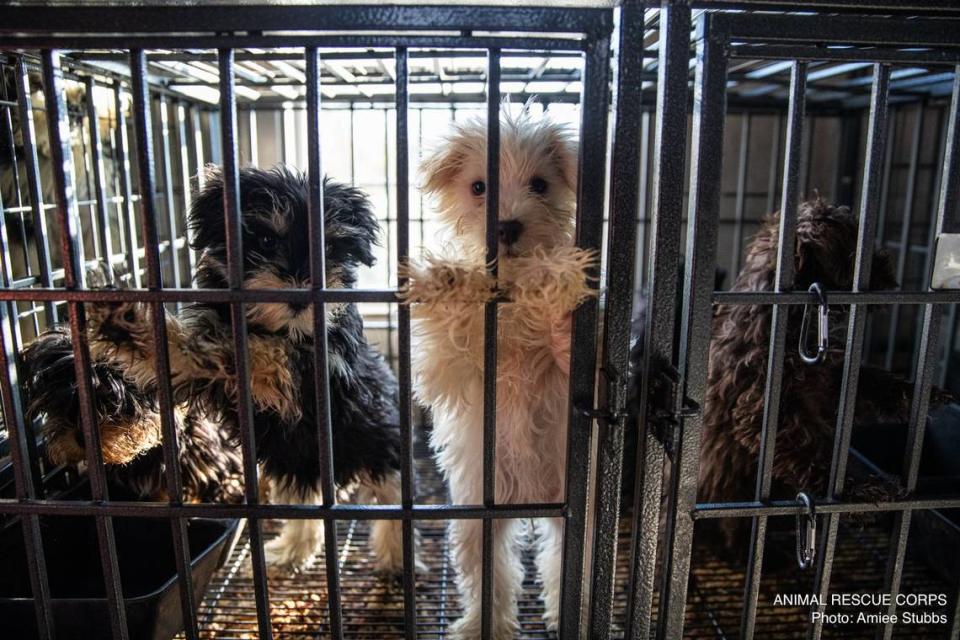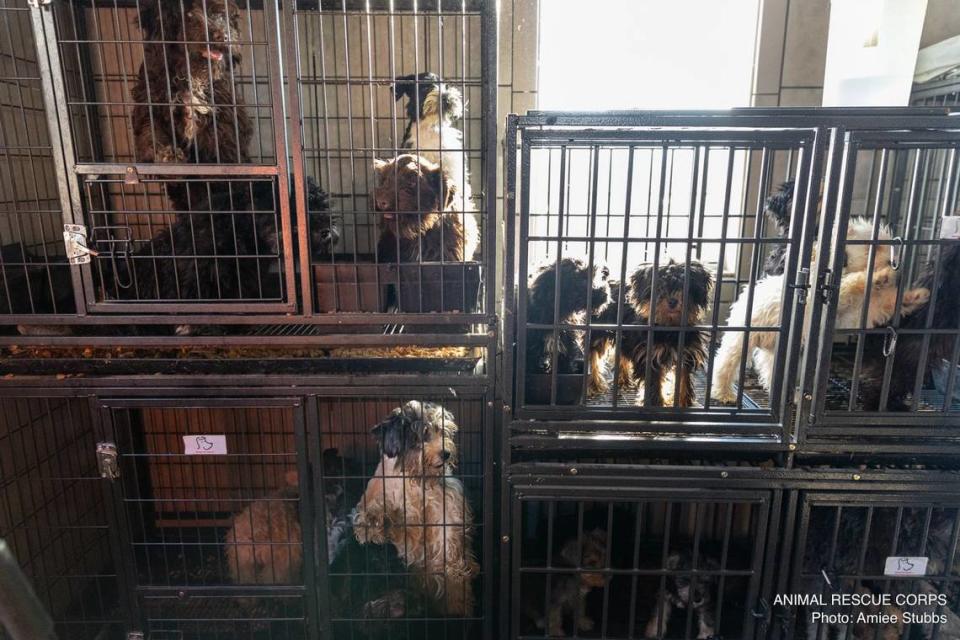Puppy mills often slip through the loopholes, experts say. Here are 5 things to know.
Animal rescue volunteers began the hard work this week of treating more than 200 puppies and dogs rescued from “deplorable conditions” at a home in Chatham County.
Most puppy mills go undetected and undeterred, according to the Humane Society of the United States.
The Chatham County Sheriff’s Office learned about the puppy mill on on Oakley Church Road in the Bear Creek community, near Siler City, when someone complained about “distressing sounds” on the property in September.
They found dozens of dogs being bred at the home, including schnauzers, mini-schnauzers and other breeds. Sheriff Mike Roberson said his department tried to work with the owner in an unsuccessful attempt to have her rectify the situation.
In January, deputies returned to the home, seizing 44 dogs with the most critical problems, he said. They returned to the home on Tuesday with animal rescue officials and volunteers from the Bissell Pet Foundation and Animal Rescue Corps.
Rescue officials, volunteers and deputies seized another 170 dogs and puppies. At least 10 dogs and puppies were dead, Roberson said.
The Sheriff’s Office charged two people with 10 counts of misdemeanor animal cruelty in the case: Alicia Dawn Culberson, 36, and Kelly Dawn Privat, 48. Privat is scheduled to appear in court Feb. 26; Culberson’s court date is March 13.
Are puppy mills illegal?
A “puppy mill” is a dog-breeding facility that produces a high volume of dogs for sale and keeps them in unhealthy and often inhumane conditions. The dogs are often sold online or at flea markets, but also can be found in pet stores, officials say.
Roughly 10,000 puppy mills are thought to be operating in the United States, producing at least 2.6 million puppies a year and keeping roughly 500,000 dogs for breeding purposes, the Humane Society of the United States reports. Puppy mills are legal in most states, but owners can be prosecuted under animal cruelty laws for not providing adequate food, water and shelter
The federal Animal Welfare Act, enforced by the U.S. Department of Agriculture, requires minimum care standards for commercially sold pets. The system is not foolproof, animal advocates say, and only applies to commercial breeders operating a wholesale business.
What happened at Chatham County’s puppy mill?
The dogs were suffering from neglect and being kept “in life-threatening conditions,” said Tim Woodward, executive director of Animal Rescue Corp. They were surrounded by several inches of urine and feces and were suffering from dehydration, malnutrition, parasites, untreated injuries and illnesses, severe matting and skin conditions. At least 10 dogs, including puppies, were dead.
Deputies had to visit the property twice to seize all the animals, because Chatham County’s animal shelter only has room for 50 dogs, Roberson said. They contacted the animal welfare organization Bissell Pet Foundation and Animal Rescue Corps, a national nonprofit, after realizing the severity of the situation. The rescue groups brought volunteers from several states to rescue the animals.
What will happen to the dogs?
Animal rescue groups will keep the dogs until the cases against their owners can be settled in court. The dogs will be treated for medical and physical problems and any social issues at undisclosed rescue facilities before being placed for adoption.
Animal Rescue Corps and BISSELL Pet Foundation are raising money to care for and shelter the dogs at animalrescuecorps.org and bissellpetfoundation.org.
How can I avoid puppy mills?
Potential owners should adopt a pet from their local animal shelter or rescue group, instead of purchasing one from a pet store or breeder, said Kim Alboum, director of field operations for the Bissell Pet Foundation.
If that’s not possible, visit the property where a private seller is breeding or raising puppies to see how they are treated, she said. Ask questions about the puppy and its environment, and be wary of breeders who only let you see one puppy at a time or don’t want you to visit.
“If it feels wrong when you’re visiting a property, when you’re purchasing a pet, it is wrong, and you should report it to your local law enforcement and walk away,” Alboum said.
If you do buy from a pet store, the Humane Society recommends asking to see paperwork showing who bred the puppy and where — an out of state breeder may indicate that the puppy was purchased from a mill, experts say. Also get health reports that include vaccinations and dates given, and the name and phone number of the veterinarian who examined the puppy.
Carefully read any health guarantees. Several states have “puppy lemon laws” — North Carolina is not one of them — that require a seller to refund a buyer’s money, provide another puppy or pay money toward any veterinary bills if someone buys a sick dog.
Does NC have puppy mill laws?
North Carolina law is fairly basic when it comes to preventing puppy mills and punishing bad breeders.
The law defines a pet dealer as someone who breeds more than five female dogs in a year, and that person has to be licensed and provide basic food, water and shelter. Dealers also must protect animals from sanitary, moisture and mold issues, excessive sun, inclement weather, pests and health problems.
However, violators are rarely punished unless someone makes a report to law enforcement, and state law treats most violations as misdemeanors. Punishments can range from a $5 fine per animal to $25 for not having a license, according to the Humane Society. The maximum fine in most cases is $1,000.

